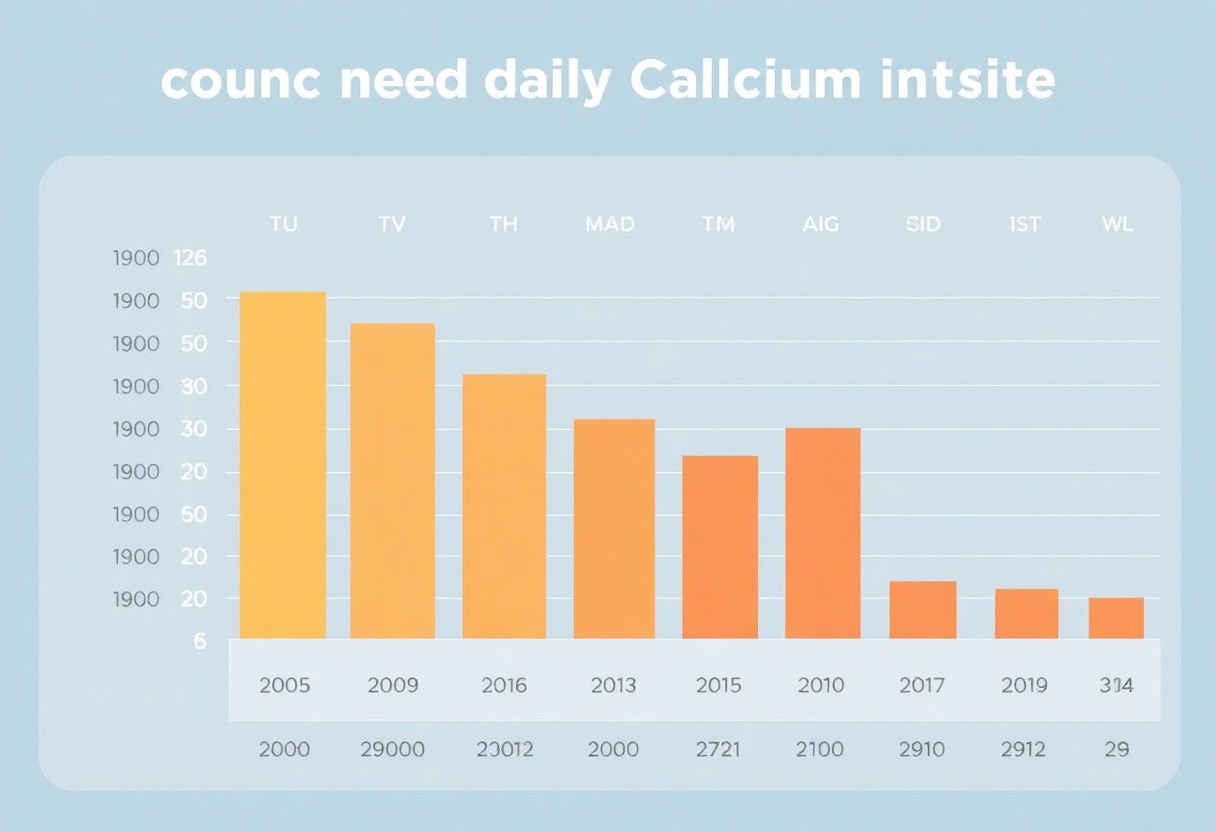Calcium plays a vital role in the growth and development of children, contributing to strong bones and teeth, as well as supporting nerve function and muscle health. Choosing the right calcium supplement is crucial to ensure that children meet their daily calcium needs, especially when dietary intake might fall short. This article delves into understanding children’s calcium requirements, explores various supplement types like chewables and liquids, and examines essential factors such as bioavailability and potential allergens. By providing insights into related nutrients like vitamin D and magnesium, and discussing possible side effects, this guide aims to help parents make informed decisions for their child’s health.
Key Takeaways
- Understanding your child’s specific calcium needs based on age is crucial for selecting the appropriate supplement to support their growth and development.
- Different types of calcium supplements, such as chewables, tablets, and liquids, offer varied benefits, making it essential to choose the form that suits your child’s preferences and requirements.
- Factors like bioavailability, taste, and the presence of dietary restrictions or allergens should be considered to ensure the supplement’s effectiveness and acceptance by your child.
- Adequate levels of vitamin D and magnesium are important in optimizing calcium absorption, highlighting the need for a well-rounded supplement approach.
- Consulting with healthcare providers can help tailor a supplement regimen that aligns with your child’s unique health needs and dietary patterns.
Understanding Calcium Needs for Children

Calcium is an essential mineral needed for the growth and development of children’s bones and teeth. The recommended daily intake of calcium varies with age, ensuring that each developmental stage is supported. According to the Institute of Medicine, children aged 1 to 3 years require around 700 milligrams per day, while those aged 4 to 8 years need approximately 1,000 milligrams. For adolescents aged 9 to 18 years, a higher intake of 1,300 milligrams daily is recommended to help achieve peak bone mass.
To adequately meet these requirements, understanding dietary sources is crucial. Dairy products like milk, cheese, and yogurt are well-known sources, containing considerable amounts of calcium. However, for those who are lactose intolerant or following a vegan diet, fortified plant-based milks and juices, as well as leafy green vegetables like kale and broccoli, are excellent alternatives.
Beyond dietary sources, it’s important to consider nutritional guidelines when selecting calcium supplements for children. Pediatricians often recommend supplements when a child’s diet does not fulfill their calcium needs. However, over-supplementation can lead to complications such as kidney stones or impaired absorption of other essential minerals.
Additionally, factors such as the absorbability of calcium supplements must be considered. Calcium citrate is absorbed well on an empty or full stomach, making it a versatile option. On the other hand, calcium carbonate should ideally be taken with food for better absorption. Monitoring these factors ensures children receive optimal calcium support for their growth and developmental needs.
Types of Calcium Supplements
Calcium supplements come in various forms, each offering unique benefits and potential drawbacks. When selecting a supplement for your child, it is essential to understand these variations to make an informed choice.
Chewable Calcium Supplements are often favored for children due to their convenience and palatability. These typically come in flavors that appeal to kids, such as berry or citrus, making them easier to incorporate into daily routines. However, be mindful of added sugars that might be present to enhance taste.
Calcium Tablets provide a more traditional option and are generally more concentrated than chewables. They offer precise dosage control, which can be advantageous for managing specific dietary requirements. Tablets, however, can be harder for young children to swallow and might require breaking or crushing.
Liquid Calcium Supplements are another popular choice, offering ease of administration, especially for younger children or those with swallowing difficulties. These often allow for flexible dosing and can be mixed with beverages. The potential downside is the taste, which might not be as appealing as chewable forms.
Powdered Calcium Supplements allow customization as they can be added to various foods and drinks. They provide flexibility in adjusting doses and are suitable for children with particular texture preferences.
When choosing the right form, consider factors such as ease of consumption, dosage accuracy, and ingredient preferences. It is crucial to weigh these considerations in the context of your child’s taste preferences and any dietary restrictions they may have.
Factors to Consider When Choosing a Supplement

When selecting a calcium supplement for your child, several critical factors should be taken into account to ensure both safety and effectiveness. One of the most important aspects is bioavailability—the degree to which calcium is absorbed into the body. Certain forms, such as calcium citrate, tend to be more readily absorbed than others, potentially offering greater health benefits.
Another consideration is taste, as palatability is crucial for ensuring children take their supplements consistently. Calcium supplements are often available in various flavors to make them more appealing to young ones.
Dietary restrictions also play a significant role in the decision-making process. For instance, families following a vegan lifestyle should look for supplements that do not contain animal-derived ingredients. Additionally, those with lactose intolerance should select lactose-free options to avoid discomfort.
It is equally important to be mindful of potential allergens. Always read the labels for common allergens such as gluten, soy, and nuts to prevent adverse reactions in children with allergies.
Lastly, consider the form of the supplement, as it impacts ease of consumption. Options include chewables, gummies, tablets, or liquid forms, each offering different benefits. For example, liquid forms might be suitable for younger children who have difficulty swallowing tablets.
Taking these factors into account will not only help you select the best calcium supplement for your child but also ensure it fits seamlessly into their lifestyle and dietary needs, promoting better health and development.
The Role of Vitamin D and Magnesium
Vitamin D and magnesium are indispensable allies in the journey to ensure optimal calcium absorption for growing children. Vitamin D, often referred to as the “sunshine vitamin,” facilitates the intestinal absorption of calcium, directly influencing bone health and strength. Without adequate vitamin D, even diets rich in calcium can fall short of supporting healthy bone development. Children can synthesize this crucial vitamin through modest sun exposure, yet supplementation becomes essential when sunlight is limited, especially during fall and winter months.
Magnesium, on the other hand, performs a pivotal role in the structural development of bones. It partners with calcium and vitamin D to enhance mineralization and regulate parathyroid hormone levels, which are critical for maintaining calcium balance within the body. An imbalance in magnesium intake can disrupt this harmony, potentially hampering bone growth and health.
For parents considering calcium supplements, it’s prudent to choose formulations that include vitamin D and magnesium. This combination not only bolsters calcium utilization but also promotes overall skeletal health. Key benefits include:
- Improved Calcium Bioavailability: Ensures that calcium is effectively absorbed and deposited in bones.
- Enhanced Bone Integrity: Supports stronger bone matrix creation with the synergistic effect of these nutrients.
- Balanced Mineral Levels: Maintains optimal levels of calcium and other minerals, reducing the risk of deficiencies.
Incorporating foods rich in vitamin D and magnesium, such as fatty fish, leafy greens, nuts, and seeds, can further fortify a child’s diet, making supplements an effective adjunct rather than a sole source.
Safety and Potential Side Effects
Calcium supplements are generally safe for children when used according to the recommended dosage. It is important, however, to be vigilant about the appropriate intake levels, as excessive consumption can lead to potential health concerns. Ensuring the right dosage is crucial since too much calcium may result in conditions such as constipation, abdominal pain, or, more seriously, hypercalcemia—a condition characterized by elevated calcium levels in the blood, which can affect kidney function.
To ensure safety, it is advised to carefully assess the total daily calcium intake, including both dietary sources and supplements, to avoid surpassing the tolerable upper intake level (UL) for each age group. For example, children aged 1 to 3 years should not exceed 2,500 mg per day, while those aged 4 to 8 should limit intake to 3,000 mg.
Parents should also be aware of potential interactions with other medications and nutrients. For instance, calcium can interfere with the body’s absorption of other minerals such as iron and zinc, which are equally vital for growth and development. Thus, a balanced approach is necessary, potentially adjusting the timing of supplement intake to prevent such interactions.
Monitoring for side effects is an essential part of supplement use. If a child exhibits signs of digestive issues, fatigue, or frequent urination after starting calcium supplements, it is wise to consult a healthcare provider promptly. This ensures any adverse effects are addressed, maintaining the child’s overall well-being while supporting their developmental needs.
Incorporating Calcium from Food vs. Supplements

Incorporating calcium through a balanced diet rich in calcium-containing foods offers a host of benefits for children. Foods such as dairy products (milk, cheese, yogurt), leafy greens, and fortified cereals are not only rich in calcium but also provide children with additional nutrients essential for their growth and development. Consuming calcium from foods often ensures better absorption, as these foods also contain other elements like phosphorus and vitamin D, which aid in the process.
However, there are instances where dietary calcium might not meet the recommended daily intake, necessitating the use of supplements. Situations such as dietary restrictions, lactose intolerance, or vegan diets may limit a child’s ability to consume adequate calcium-rich foods. In such cases, supplements can be beneficial but should be regarded as an adjunct to the diet rather than a primary source of calcium.
Benefits of obtaining calcium from food include:
- Provides additional vitamins and nutrients.
- Naturally contains calcium-friendly components.
- Encourages a healthy and varied diet.
When to consider supplements:
- If dietary intake insufficiently meets daily calcium needs.
- In cases of dairy intolerance or specific dietary preferences.
- As recommended by healthcare professionals after evaluating individual needs.
Ultimately, while supplements are valuable in certain scenarios, promoting a food-first approach—where possible—helps in comprehensive nutritional intake. Prioritize dietary sources and utilize supplements to bridge gaps only as necessary, ensuring children receive a balanced intake of all essential nutrients.
Consultation with Healthcare Providers

Before introducing any calcium supplement into your child’s diet, it’s essential to seek advice from qualified healthcare providers such as pediatricians or dietitians. These experts can provide tailored recommendations based on your child’s unique health profile, dietary needs, and lifestyle habits, ensuring that supplements are both required and safe.
Pediatricians are invaluable resources as they understand the specific developmental stages and nutritional requirements of children. They can assess whether your child’s diet lacks adequate calcium and recommend an appropriate supplement dosage. Additionally, they can identify any potential allergies or interactions with existing medications that could affect your child’s health.
Dietitians, on the other hand, can offer insights into how to incorporate calcium naturally into your child’s diet through food. They can help construct a balanced diet plan that includes calcium-rich foods, potentially reducing or eliminating the need for supplements. Should supplements still be necessary, dietitians can guide you on choosing the most effective and safe options, factoring in the child’s taste preferences and any dietary restrictions.
It’s crucial to remember that every child is different, and what works for one may not be suitable for another. Consulting a healthcare provider ensures a personalized approach, significantly lowering the risk of unnecessary supplementation or adverse effects. Engaging in an open dialogue with your healthcare provider about your concerns and expectations can greatly aid in making informed, confident decisions regarding your child’s health and nutrition.
Conclusion
Choosing the best calcium supplement for your child requires careful consideration of their unique dietary needs and the various supplement options available. Ensuring adequate calcium intake is vital for their growth and bone health, with a focus on forms that guarantee optimal absorption. As dietary habits and health profiles evolve, balancing calcium from both foods and supplements becomes increasingly relevant. Consulting healthcare providers will provide personalized advice tailored to your child’s needs, fostering long-term health benefits. By making informed choices, you can support your child’s development, laying a robust foundation for a healthy future.
Frequently Asked Questions
What are the most important factors to consider when selecting a calcium supplement for my child?
When choosing a calcium supplement, consider bioavailability, as it determines how efficiently calcium is absorbed. Also, taste preferences, dietary restrictions, and potential allergens play significant roles in ensuring your child benefits fully from the supplement.
How much calcium does my child need each day?
The recommended daily calcium intake varies by age: ages 1-3 require 700 mg, 4-8 need 1,000 mg, and 9-18 should have 1,300 mg. Meeting these requirements supports optimal bone growth and development.
Are there side effects associated with calcium supplements for children?
While calcium supplements are generally safe, excessive intake can lead to side effects such as constipation or abdominal discomfort. It’s essential to follow dosage recommendations and consult a healthcare professional for advice tailored to your child’s needs.
Should I prioritize calcium-rich foods over supplements for my child?
Prioritizing calcium-rich foods, like dairy products and leafy greens, is ideal, as they provide additional nutrients. However, supplements can be beneficial if dietary intake is insufficient or particular dietary restrictions exist.
How do vitamin D and magnesium affect calcium absorption in children?
Both vitamin D and magnesium play crucial roles in calcium absorption. Vitamin D enhances calcium uptake in the gut, while magnesium helps regulate calcium levels. Ensuring adequate intake of these nutrients supports effective calcium utilization in children.


